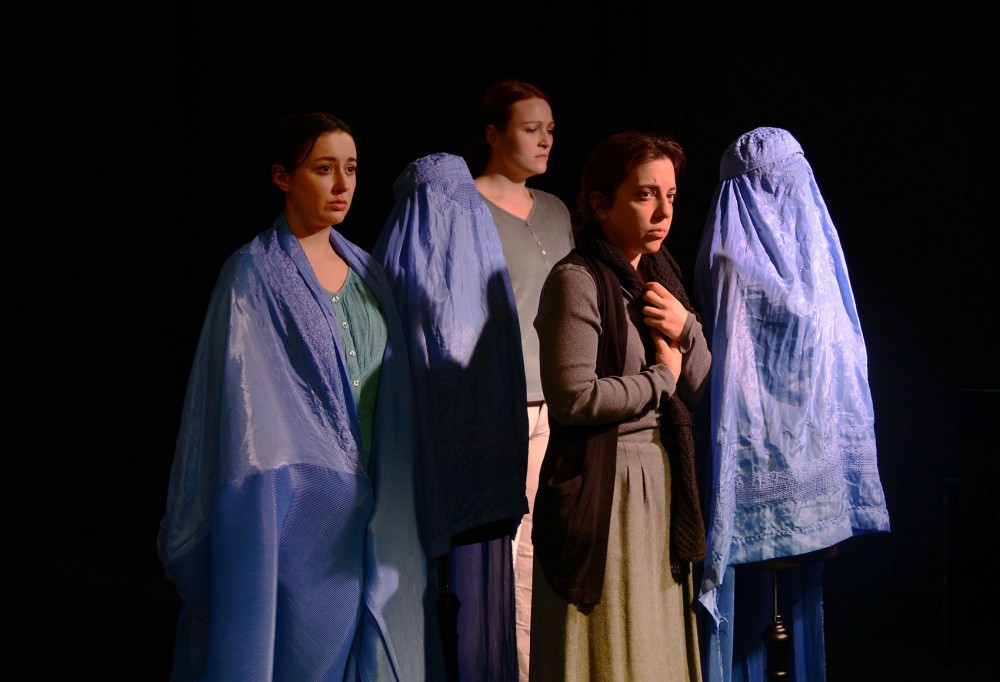Kiomars Moradi spent a lot of time on buses when he immigrated to the United States, mostly because he didn’t know how to get off.
“I passed a lot of stops,” he said with a laugh.
The founder of Hope Theater Company didn’t speak a word of English when he arrived in Minnesota in 2010. He’s come a long way since then, directing, writing and designing lights for Hope’s first show, “Love Letters from the Middle East.”
Moradi is well-known in the international theater world, having received awards in countries like India and Spain. Additionally, he’s made appearances at the Avignon Festival and taught at Azad University of Iran.
Moradi emigrated from Tehran after one of his close friends at the university was imprisoned. And his play “The Skyless City” about Iran’s indifference to human trafficking had gotten him into trouble with the government.
“I said to myself, ‘I have to go.’ They took my opportunities, and I didn’t have a chance to do something,” he said.
Moradi’s brother-in-law was his only relative in the U.S. With his help, the director settled in Minnesota. After starting English classes and going to meetings at Springboard for the Arts, he began to meet up with other artists in the cities, specifically Zaraawar Mistry of Dreamland Arts.
“He helped me find theater groups, introduced me to many people, many places. He taught me how to write grants,” Moradi said.
Mistry also gave Moradi a place to produce. Moradi’s remount of “The Skyless City” received great acclaim in its run at Dreamland in 2011. Now, “Love Letters from the Middle East” marks his first step toward establishing himself as a consistent voice in the theater community.
The show follows three women — two from Iran and one from the U.S. — and their experiences in the crossfire of war. The story is told through three separate monologues, with each character speaking for about 25 minutes about their individual realities. “Love Letters” deals with heavy material — the terrors of violence and its lasting effects — but roots itself in a hope for a better future.
Moradi decided to create Hope Theater Company soon after moving to Minnesota, having noticed the microscopic Iranian population in the Twin Cities.
“We got together and we thought, ‘Why not?’ We could actually create a company to do something different,” he said.
In a society that can hold hostility toward the Middle East, Moradi decided to make theater that reflected his culture’s untold stories.
“There is a revolution in this conversation,” he said. “We need to talk about these people.”
Actress Emily Rose Duea stumbled upon Hope Theater Company through an audition for “Love Letters.” After two months of working on the piece, she found herself greatly inspired by Moradi.
“We all feel like a family,” she said. “My favorite thing about working with Kio is that he’s very collaborative — he takes into account that every actor brings something to the table.”
Though Rose Duea is playing an Iranian character, she is not from the Middle East. Moradi did that intentionally.
“I said to myself, ‘Kio! You’re in the United States. You need to work with everybody, not just actors who are Middle Eastern,’” he said.
Rose Duea was quick to add to Moradi’s statement.
“It has to be done in a way where you are portraying a person, not a race,” she said. “We aren’t constraining ourselves to being one type of company.”
Constraint is the opposite of Hope’s intentions — all Moradi wants is an open forum.
What: “Love Letters from the Middle East”
When: 8 p.m., Thursdays through Saturdays; 3 p.m., Sundays; Nov. 7-17
Where: Dreamland Arts, 677 N. Hamline Ave., St. Paul
Cost: $10-15














